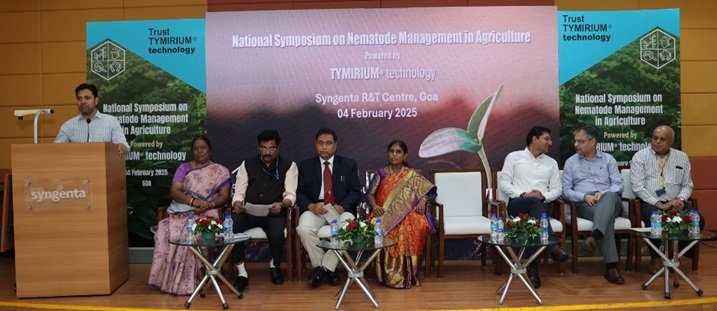Indian agri scientists and Syngenta join forces to combat nematodes, the invisible crop threat
The initiative aims to develop technology-driven solutions for nematode management while increasing farmer awareness about its impact.
In a first-of-its-kind initiative, over 100 agricultural scientists from across the country convened to address the growing threat of nematodes — a major cause of crop losses, resulting in an estimated financial impact of Rs 25,000 crore annually. At a symposium in Goa organised by Syngenta India, experts emphasized the urgent need for effective nematode management to safeguard soil health, sustain crop productivity, and minimize chemical interventions. While acknowledging the government’s agriculture-focused Budget, the scientists urged stronger investments in scientific research and a more robust R&D pipeline to combat this ‘silent killer.’”
At a national symposium on ‘Nematode Management in Agriculture’ experts highlighted the devastating impact of nematodes, microscopic worms that attack plant roots, causing stunted growth, reduced yields, and heightened vulnerability to diseases. They emphasized the need for sustainable management strategies, including crop rotation, resistant plant varieties, and biological control agents, to mitigate losses and ensure long-term agricultural productivity.
The day-long symposium, held at the Syngenta R&T (Research & Technology) Centre in Goa, aligns with Syngenta India’s commitment to collaborative partnerships with universities and research institutes. The initiative aims to develop technology-driven solutions for nematode management while increasing farmer awareness about its impact.
In his inaugural address, Susheel Kumar, Country Head and MD, Syngenta India Pvt Ltd, emphasized the critical role of farmers in addressing agricultural challenges.
Speaking on the impact of plant parasitic nematodes on crop yields, Vinod Shivrain, Head of Crop Protection R&D at Syngenta India, said, “Our goal is to raise awareness, demonstrate innovative technologies, and develop effective, sustainable solutions to tackle plant parasitic nematodes. Through partnerships between the corporate sector and academia, we aim to leverage technical expertise and resources to manage the nematode-disease complex more effectively and ensure long-term agricultural resilience.”
Dr. Pankaj Singh, Head of Nematology at IARI, New Delhi, highlighted the often-overlooked threat posed by nematodes, saying, “Nematodes present a hidden danger to crops, as their impact remains unnoticed until significant yield losses occur. By the time farmers detect the damage, it is often too late.”
Dr. R. Sarada Jayalakshmi Devi, Vice Chancellor of Acharya N.G. Ranga Agricultural University, Guntur, Andhra Pradesh, focussed on the significant yield losses caused by nematode infections in horticulture during his keynote address.
Dr. Devi further stressed the importance of collaboration between government institutions, universities, and industry in tackling plant parasitic nematodes. He highlighted the growing threat of the rice root-knot nematode, which was previously considered a severe issue only in upland areas but is now emerging as a major concern across rice farms nationwide.
Reflecting further, Kumar said, “Our scientists breed thousands of new seed varieties and explore over 100,000 new compounds every year. Our products help farmers to transform agriculture. We seek and move into new areas that help make farmers even more successful. This national symposium opens doors for more collaboration, knowledge sharing and work jointly to address nematodes and other soil diseases issues.”
The initiative aims to develop technology-driven solutions

